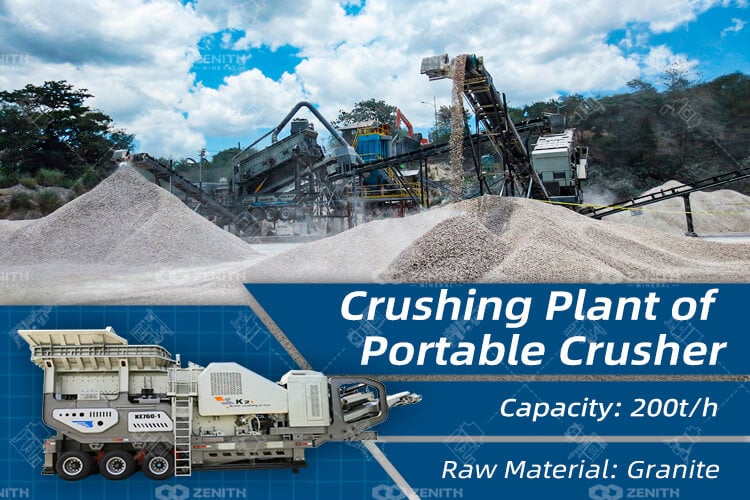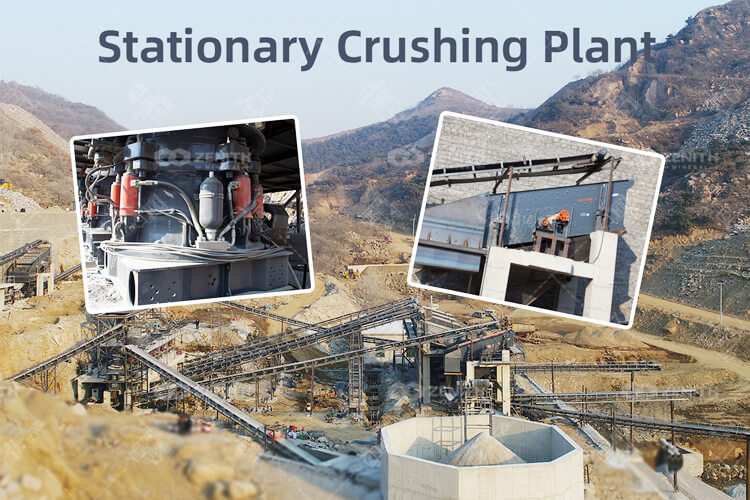Portable Rock Crusher VS Stationary Crusher
What Is A Portable Rock Crusher?
Portable rock crushers are mobile crushing and screening plants that are designed to be easily transported between different work sites. They are typically compact in size and can be towed or transported on a trailer. Portable rock crusher is equipped with a crusher unit, a vibrating feeder, and a conveyor, allowing for on-site crushing of rocks and materials. They provide the advantage of mobility, allowing operators to bring the crushing process directly to the location where the materials are generated or needed. Portable rock crushers are commonly used in construction, mining, and recycling applications.

What Is A Stationary Crusher?
Stationary crusher, as the name suggests, are fixed crushing and screening plants that remain in a permanent location. They are designed to handle large volumes of material over an extended period. Stationary crushers are typically larger and more robust than portable crushers, and they require infrastructure such as foundations and conveyors. They are suitable for long-term operations and can handle high-capacity crushing needs. Stationary crushers are commonly used in mining, quarrying, and aggregate production industries.

The Difference Between Portable Rock Crusher And Stationary Crusher
When comparing portable rock crushers to stationary crushers, there are several factors to consider, including mobility, flexibility, efficiency, and cost. Here's a breakdown of the key differences:
1. Mobility
- Portable Rock Crusher: As the name suggests, portable rock crushers are designed to be mobile and easily transported from one location to another. They can be quickly set up at different job sites, offering flexibility and the ability to crush materials on-site.
- Stationary Crusher: Stationary crushers are fixed in one location and are typically used for large-scale operations where high production capacities are required. They are typically installed in a permanent location and require more extensive infrastructure, such as foundations and conveyors.
2. Flexibility
- Portable Rock Crusher: Portable crushers offer greater flexibility in terms of the types of materials that can be crushed and the applications they can be used for. They can handle various rock types and can be adjusted to produce different sizes of output material.
- Stationary Crusher: While stationary crushers are effective for specific applications and can handle a wide range of materials, they are less flexible compared to portable crushers. Changing the location or adjusting the output size may require significant modifications or additional equipment.
3. Efficiency
- Mobility Advantage: Portable rock crushers offer the advantage of mobility, allowing them to be easily transported to different job sites. This enables on-site crushing, reducing the need for material transportation and potentially increasing efficiency.
- On-Site Processing: Portable rock crushers can process materials directly at the job site, eliminating the need to transport materials to a stationary crusher. This can save time and reduce costs associated with material handling.
- Versatility: Portable rock crushers can be used in various applications and industries, providing flexibility in their use. They can handle different types of materials and can be adjusted for different crushing requirements.
4. Cost
- Initial Investment: Stationary crushers generally require a significant initial investment due to their fixed structure and infrastructure requirements. Portable rock crushers, while still requiring an investment, often have lower initial costs compared to stationary crushers.
- Operating Costs: Portable rock crushers may have lower operating costs compared to stationary crushers. They typically consume less energy and may require less maintenance and repair due to their simpler design and construction.
- Material Transportation: Stationary crushers often require materials to be transported to and from the crusher, which can incur transportation costs. Portable rock crushers, being mobile, eliminate or reduce the need for material transportation, potentially saving on transportation costs.
It's important to note that the choice between portable rock crushers and stationary crushers depends on the specific needs and circumstances of each project. Factors such as the nature of the materials, required output size, project duration, and budget will all play a role in determining the most suitable option.







